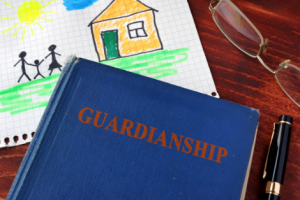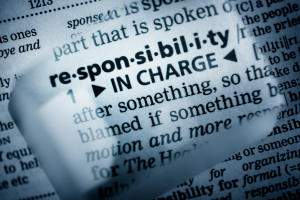
Guardians/Conservators
Updated: December 15, 2022
After you pass away and you either have no surviving spouse or your spouse dies at the same time, there may be minor children or other dependents such as disabled or cognitively impaired adults that still need to be cared for and supervised. You will need to choose a legal guardian for them and include this in your will. You may choose multiple guardians such as a married couple or co-guardians, or different guardians for each child if you think they would be able to live apart.
 If you have a surviving spouse, they will usually become the children’s guardian. In most states there can be exceptions, such as the court deems them unfit, your current spouse has adopted them, or the child is old enough to request a different guardian — the age varies by state.
If you have a surviving spouse, they will usually become the children’s guardian. In most states there can be exceptions, such as the court deems them unfit, your current spouse has adopted them, or the child is old enough to request a different guardian — the age varies by state.
In some states they may be known as conservators, but a conservator is technically the person who manages your minor children’s finances. The conservator and guardian could be different people.
You can also name a guardian for any pets in your will, but you can’t leave an animal any gifts directly. You must either set up a pet trust fund or leave any gifts that would be used by your pet to the chosen guardian.
Choosing a Guardian
Any guardian chosen must be a person(s) at least 18 years old who can make decisions for your dependents (generally referred to as the “ward”) when they are too young or can’t make decisions for themselves. Guardianship laws can vary by state.
Because of this high level of responsibility, choose guardians carefully. You should make this decision with your spouse/partner if possible, and look for qualities that are most important to you. You may want to write them down or create a checklist to make it easier to assess these qualities in your choices.
Common choices include the non-custodial parent, grandparents — although you must factor their age into the decision, other relatives (older siblings, aunts, uncles, or cousins), family friends, godparents, and/or neighbors. Naming co-guardians can be a problem if one of them is not a blood relative, such as your sister and brother-in-law if they get divorced.
The state can become the guardian if there are no other options.
It may be difficult to make a decision requiring you to take your time to think about it, if you can, or as simple as the person/people you know would step in unasked if you and your spouse were in an accident. Even if you and your spouse/partner disagree or you are torn between potential guardians, talk it over and use your intuition to decide. If your wills conflict or you have no wills and you die at the same time the probate court will make the decision if your child is not old enough to. Talking to the potential candidates can help you finalize the decision.
Once you have chosen your candidate, discuss it with them before designating them in your will.
Schedule time to meet with them privately to make your request.
Once you have decided to choose a person or couple, explain what the process is like, including:
- Under what circumstances they would become guardians;
- Essential details, such as how you want your children to be brought up; and/or
- Practical information, such as financial support and your children’s activities.
There is no need to cover everything right away. You can take additional time to discuss the details of their guardianship.
Put your thoughts into writing so the guardian will know exactly what you want for your child, including any values you would want them to continue.
 Other candidates can be listed as back-up or successors in that section/article of your will. A successor may be needed if the guardian becomes incapacitated or is replaced by the court for other reasons. Without successors the court will assign a guardian based on that state’s guidelines, usually a family member.
Other candidates can be listed as back-up or successors in that section/article of your will. A successor may be needed if the guardian becomes incapacitated or is replaced by the court for other reasons. Without successors the court will assign a guardian based on that state’s guidelines, usually a family member.
Addenda to the will such as power of attorney, medical directives, or a codicil are ways to direct your executor and the court on how to handle matters if you become incapacitated and your dependents-appointed guardian becomes physically or mentally incapacitated without a successor.
If you and your spouse/partner choose different guardians and die at the same time, you do not choose a guardian, or you have no will, the probate court will decide on the best guardian for your children based on the state’s guidelines.
- The court will usually give custody to the person most closely related to your child, but not always. The probate court may consider very close family friends.
- Any adults who have an existing close relationship with your children can nominate themselves as guardian.
- The decision is ultimately up to the probate court judge.
Your Children's Guardian
This may be the most important decision in your will if you have minor or disabled children. A guardian is the person(s) who will parent your children and bring them up until they reach the age of majority, usually 18 years old, or no longer need a guardian. You may choose multiple guardians such as a married couple, or different guardians for each child. You cannot bypass an ex-spouse if they are your children’s parent and are fit to care for them.
 Here is a brief list of some of the factors that you and your spouse/partner may want to consider when you make your decision about your children’s guardian.
Here is a brief list of some of the factors that you and your spouse/partner may want to consider when you make your decision about your children’s guardian.
- How important is it for the guardian to be a family member?
- They should have qualities to assure the well-being of your child/children.
- Your child/children should know, like, and trust their guardian, in addition to helping to choose and/or agreeing with the choice.
- They must be caring, reliable, responsible, trustworthy, patient, and positive.
- They must have good parenting skills.
- Their views on discipline should be similar to yours.
- They should not have any habits that would impact your children’s care and health such as smoking, drinking, gambling, or other addictive behaviors.
- Would they accept being appointed as guardian?
- They should be ready to accept the responsibility without reservation.
- They should be able to perform the tasks of a guardian without undue sacrifice such as compromising personal goals, quitting a job, moving closer to your children, or needing a second job.
- They must be willing and able to fully commit to the task of raising your child/children and be physically and emotionally able to adequately care for them.
- They must be able to maintain a healthy lifestyle for your children.
- It is best if they can be relied on to be at home every night, rather than out-of-town or working a lot.
- They should be capable of providing transport for your children to school, other activities, and visits to friends and family.
- Is the guardian’s residence an appropriate place to live.

-
- Ideally, the distance from your children’s current residence should not result in the need to change schools or shift the location of their activities.
- Your children should remain close enough to their relatives and friends to see them often.
- The family and social situation should be appropriate and nurturing.
- Your child/children should comfortably fit into their family, even if the guardian has children of their own.
- The family relationships and marriage should be stable.
- There should be ample support systems.
- Depending on your assets you may need to consider their financial situation, such as if they:
- Can raise your children with their current income and assets if you can’t leave them enough;
- Own a home and vehicle;
- Have a stable job and income;
- Are responsible with money and budgeting, so could also serve as the conservator (financial manager); and/or
- Have too much debt, especially if they will have to use their own money to take care of your children.
- You may want to consider:
- Choosing different guardians for each child based on who they are closest to or would be best for them;
- How the guardian’s age and situation in life would affect their role;
- Their spiritual/religious beliefs, educational, social/economical, or political values, or interests and hobbies; and/or
- The effect of your choice on the rest of your remaining family.
Guardianship of Incapacitated or Disabled Persons
Mental and physical disability or incapacity may limit your dependent’s ability to take care of themselves, express themselves verbally, earn a living, and/or live independently. If the disability is severe enough to necessitate long-term care, treatments, and other services, you should arrange for a guardian and list them in your will. The qualities of your choice are similar to those of minor children.
A guardianship for physically or mentally disabled or incapacitated persons assures they will have adequate care and someone to facilitate their independence and self-reliance.
- The desires of your dependent should be the primary consideration.
- They should be allowed to do as much of their own caregiving as possible.
- The guardianship may be limited and only involve as much as is needed for your dependent to exercise as much control over their lives as possible while maintaining dignity, health, living standard, and self-reliance.
Alternatives to legal guardianship include Power of Attorney, Representative or Protective Payee, Conservatorship alone, or a special needs trust.
Tasks of the Guardian
A legal guardian will have a broad range of responsibilities similar to those of a parent or caretaker. In your will you may include whatever level of detail you want about how you wish each of these responsibilities to be carried out. However, it is better to include them in an addenda to the will such as power of attorney, a medical directive, or a codicil.
Some of the Major Tasks of a Guardian/Conservator
They will have physical custody of your minor child/children and/or other dependents and act as their primary caretaker.
- They must fulfill duties in the same way as you and your spouse/partner would have.
- These duties include providing food, clothing, shelter and education, maintaining their physical and emotional health, and protecting them from safety hazards.
Remain personally acquainted with your child/children or dependent and maintain enough contact to know their abilities, limitations, needs, and opportunities, and physical and mental health.
Make legal decisions on behalf of your child/children and/or dependent(s) such as where to live, where to go to school, if they can play sports, what medical care they receive, etc.
Using inherited money and assets solely for the children’s or dependent’s benefit, including:
- Paying for current needs for support, care, education, entertainment, and any other duties associated with their welfare;
- Paying all expenses to maintain any property they inherited such as taxes, mortgages, and insurance; and/or
- Preparing and filing income tax returns.
Using their own assets, if necessary, to raise your children or care for your dependent.
 Taking reasonable care of your children’s or dependent’s personal and property interests.
Taking reasonable care of your children’s or dependent’s personal and property interests.
Accepting full liability for the child’s or dependent’s actions.
If necessary, they can apply for public assistance benefits or public housing and bring a lawsuit on behalf of their ward.
If specifically designated, their guardian may also be their conservator and be responsible for handling the finances and property of your child/children/dependent. It is possible to designate another individual as the conservator to perform these functions.
- This may include investing and/or buying/selling assets, which require annual detailing.
- It may be necessary to get court approval before carrying out some of their duties and responsibilities. For example, an approval to sell a minor’s home or other property or move out of their area.
- If the assets were in a trust, this would be the trustee.
Because any will goes through the probate process, the guardian may need to provide an accounting of the children’s/dependents’ care by submitting updates to this court. These court updates should:
- Describe their living situation, current mental and physical health based on medical examinations and official records;
- Provide a list of services they are receiving;
- List services given by the guardian;
- Give an accounting of finances, including how the minor’s assets have been spent and the remaining monetary assets; and/or
- Include any other information necessary for the court to assess their status and the guardian’s performance.
Ending a Guardianship
A guardianship generally ends when the child reaches the age of majority, 18 years old in most states, although the guardianship may be continued or reinstated by the court if there is evidence that your child still requires supervision. Guardianships may be terminated if the child marries or a judge determines that it is no longer necessary or beneficial for your child.
Guardianships for disabled children will continue until the child no longer needs supervision, which may not happen if there are severe disabilities.
Guardianships are automatically terminated if your child dies. In addition, the guardianship may be terminated if the initial guardian did not adequately perform their duties for your child. A new guardian will be appointed.
Resources
- Guardianship: Key Concepts and Resources. The US Department of Justice.
- National Guardianship Association
- DeLoe R. Appointing a Legal Guardian. Legal Zoom website. Updated: May 2, 2022. Accessed: December 15, 2022.
- FAQ on Guardianship of Minor Children. LawDepot website. Updated: November 12, 2021. Accessed: December 15, 2022.
- Fletcher C. 10 Tips For Choosing A Guardian For Your Minor Child Forbes website. Posted: January 29, 2020. Accessed: December 15, 2022.
- Garber J. The Role of a Guardian or Conservator in Your Estate. the balance website. Updated: November 15, 2021. Accessed: December 15, 2021.
- Guardianships for an Incapacitated Person. The Mattar Firm website. Posted: September 29, 2021. Accessed: December 15, 2022.
- Guardianship Law and Legal Definition. US Legal website. Accessed: December 15, 2022.
- Guardianship of Incapacitated or Disabled Persons. LawDepot website. Updated: October 20, 2022. Accessed: December 15, 2022.
- Guardianship of Minors. LawDepot website. Updated: December 8, 2021. Accessed: December 15, 2022.
- Hodder C. How Do I Pick a Guardian For My Children If I Die? FindLaw website. Posted: September 30, 2022. Accessed: December 15, 2022.
- How to Appoint a Guardian for Your Children. LawDepot website. Accessed: December 15, 2022.
- How to Establish Guardianship of a Child FAQs. LawDepot website. Updated: November 14, 2022. Accessed: December 15, 2022.
- Kaminsky M. Top 10 Considerations When Naming a Guardian in Your Will. legalzoom website. Updated: November 10, 2022. Accessed: December 15, 2022.
- Otterstrom K. Guardianship for Your Children. NOLO website. Accessed: December 15, 2022.
- The Ins and Outs of Guardianship and Conservatorship. ElderLawAnswers website. Published: November 8, 2022. Accessed: December 15, 2022.
- Washington D. Child Custody After Death of a Parent. verywell family website. Updated: May 17, 2020. Accessed: December 15, 2022.
